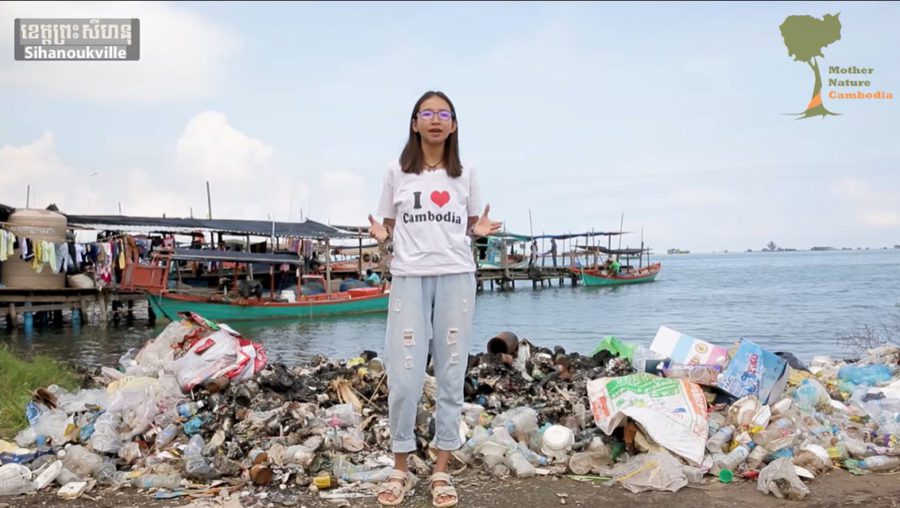A coffee seller, standing behind a cart outside a crowded Phnom Penh market, stops talking once a customer approaches.
The woman had already been speaking in a lowered voice, and only on condition that she wouldn’t be named.
“Authorities might come and ask,” the woman said. “We can’t talk freely in public. … We can’t talk straight to the point. [Even] if we see it as black, we need to add colors.”
The coffee seller was one of more than a dozen Phnom Penh residents reporters approached this week about their view on the arrests of three Mother Nature environmentalists. Sun Ratha, Yim Leanghy and Ly Chandaravuth have been charged with plotting, over a Zoom video in which they discussed satirical cartoons about Prime Minister Hun Sen.
“When I saw the news headlines I felt down. Because they are young. It is very heavy words to accuse them of treason. I am really distressed for them,” the coffee seller said quietly before she stopped.
A group of tuk-tuk drivers said they hadn’t heard about the environmentalists’ arrests — though one of the drivers eventually added: “Even if I knew about that kind of issue, I wouldn’t say or answer anything to you.”
Several residents spoke in support of the arrested activists, but a common theme was growing fear around expressing themselves.
Nov Thatsorna, a university student, was one of three respondents willing to give her name.
“It is not much different from some other people when they see the arrest of our young people who protect our environment. I am afraid for the next generation who will not dare to express themselves. I’m so sad when I heard that news,” Thatsorna said.
She said she could not understand the accusations against the Mother Nature activists. “The word ‘treason’ means to destroy the nation,” she said. “What have they done wrong? I do not really believe in law enforcement anymore.”
On Wednesday, the Interior Ministry issued a statement defending the arrests, saying Mother Nature had “the aim of causing social insecurity and impacting national stability such that the competent authorities must take legal action.”
“Their actions were manipulations aiming to incite, provoke, and [they were] gathering strength for an uprising, to create chaos in society,” the ministry said, saying environmentalism was only a banner under which the network conducted illegal activities.
Kuch Phallen, another university student, said she still felt supportive of the activists.
“As a young woman in Cambodia, I did not agree when seeing those activists arrested, because all people have the right to talk and share an issue with people. This was good activism that represented the theme of environmental issues. I do not really appreciate seeing them arrested,” Phallen said.
Mao Roeun, a tuk-tuk driver, said he was not interested in the problem of the activists’ arrests. But he did want to see a cleaner environment, he said.
“The environment in Cambodia is not good enough. We can see ourselves surrounded by plastic bags,” Roeun said. “I want to see and live in a good environment, sanitation for us.”
Social media campaigns undertaken by Mother Nature have ranged from advice about using less plastic to asking Land Management Minister Chea Sophara to resign for failing to protect the country’s beaches. Their videos have been known to be outspoken even amid the silencing of government critics in recent years.
“It isn’t suitable to arrest those activists,” said one woman who declined to be named. “Those activists have been arrested as one generation in Cambodia. I feel unsafe. … We don’t know how much we can express until the government says it’s not right.”
A university student, who also declined to be named, said teachers had stopped students from mentioning politics on campus.
“Every school. My school too,” the student said. “If we talk about politics in school, teachers will stop us.”
Education Minister Hang Chuon Naron has previously spoken about the policy, explaining, according to Radio France International, that “school is a neutral place.”
The minister has warned since at least 2015 about removing politics from campuses, though some observers, such as Human Rights Watch, have said the government has been stepping up its silencing of critics. Human Rights Watch said this week that it had recorded nearly 70 cases of members of the political opposition, youth and environmental activists, trade union leaders and journalists who are currently awaiting trial or are serving prison sentences.
In the capital, the street coffee seller who spoke cautiously behind her stall said she hadn’t seen hate in the Mother Nature activists’ campaigns.
“I have seen some videos of them, like the girl who is showing an environmental issue. She is very brave, and that video can help to educate people to love the environment and make the environment friendly,” she said.
“[They] showed how much they love the country,” the woman said. “So we need solidarity to solve this problem together.”













